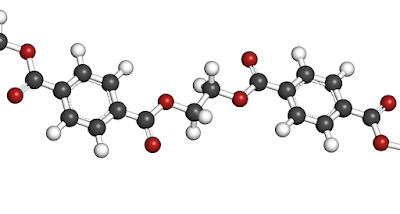What is the difference between polymer science, polymer chemistry, and polymer physics?
Polymer Science is a
generic term covering the various subdivisions of the subject.
Polymer chemists are mostly interested in the task of making plastic
substances from their precursor chemicals; by reacting ethylene, propene or
other hydrocarbons with catalysts under appropriate conditions Eg high
pressure. Plastics or thermoplastics are typically made by free radical chain
reactions. In contrast polymer resins or thermosets, another class of man-made
polymers, are made by cross linking various reactive momomers or oligomers
together, Eg polyurethane paint when spread into a thin film eg on a wall,
undergoes a cross linking reaction to form a resin; the crosslinking reaction
is induced by atmospheric oxygen. Resins unlike plastics are essentially one
big molecule! That's why there are few if any solvents for them. In contrast
plastics can be softened with solvents being linear in their structure at the
molecular level.
The distribution of polymer
chain lengths in a given plastic material is largely controlled by the kinetics
of the free radical chain reaction, in the monomer to polymer conversion
process. So you've got to like reaction kinetics if you want to be a polymer
chemist! Lots of physical chemistry.
Rubbers are amorphous thermoplastics above their glass transition temperature. Polymer spectroscopy carried out for polymer material identification purposes is also a speciality within the field of polymer chemistry. Also gel permeation chromatography or gpc which is another polymer characterization technique.
Rubbers are amorphous thermoplastics above their glass transition temperature. Polymer spectroscopy carried out for polymer material identification purposes is also a speciality within the field of polymer chemistry. Also gel permeation chromatography or gpc which is another polymer characterization technique.
In contrast, polymer
physicists are more interested in the physical properties of the materials
polymer chemists have made for us. Such as the optical properties of the
polymer ( Eg contact lenses ), the behavior of polymers in solution ( Eg
non drip paint; which is a non-Newtonian fluid ie its viscosity decreases when
a shearing force is applied to it eg paint brush spreading paint on a
wall, and increases when that force is removed, Eg paint brush removed from
wall on its way to paint tin for more paint ). Polymer physics also includes
the study of light scattering by polymers;( eg used as a polymer
characterization method ); the study of the statistical mechanics of rubber
elasticity, plus other theoretical topics. Also polymer crystallography, and
Raman spectroscopy.
Polymer material scientists tend to be interested in the engineering
properties of substances that happen to be a plastic or resin. So like
metallurgy, polymer materials science concerns itself with stress strain
relationships & the tensile strength of the material; with the toughness of
the polymer material; its hardness; the material's melting point or glass
transition temperature; creep; & materials selection for mechanical design.
Plus properties metals don't have such as viscoelasticity.
The strength of materials is a fundamental subject within materials
science whether the material under study is a metal, plastic, resin, composite,
glass, a ceramic, or concrete; or a natural material such as wood or granite.
Polymer blending is
another subject within polymer materials science. Also thermal analysis, using
techniques such as TG, DTA, & DSC.
Turning to polymer engineering. Polymer engineers often have degrees in mechanical engineering. Polymer engineering concerns itself with the moulding or castings of polymer materials into useful engineering products. Things such as plastic buckets, rainwater goods, tyres, yacht hulls, plastic bottles, aircraft windows, plastic shopping bags, sneakers, shoes, car panels, train seats, aircraft interiors, vending machine tea cups, toys, sports equipment etc, the list goes on !
Major polymer engineering processes deployed to make such goods include; plastic injection moulding ( plastic washing up bowls made using this type of moulding machine ), vacuum forming ( plastic egg cartons made in this way ), extrusion machines ( PVC drain pipes ), plastic composite mouldings ( yacht hulls, aircraft wings, military technology ), reaction injection moulding ( automobile panels ), blow moulding ( plastic bottles ), & rotomoulding ( large plastic tanks ).
Polymer technology has a slightly broader remit covering subjects in addition to polymer engineering ranging from polymer additives for car engine oil ( Eg star polymers ), to medical polymers (Eg pace makers ), polymers in electronics, household paints, fabrics, rope, polythene beakers for hydrofluoric acid. In fact any useful application.
Turning to polymer engineering. Polymer engineers often have degrees in mechanical engineering. Polymer engineering concerns itself with the moulding or castings of polymer materials into useful engineering products. Things such as plastic buckets, rainwater goods, tyres, yacht hulls, plastic bottles, aircraft windows, plastic shopping bags, sneakers, shoes, car panels, train seats, aircraft interiors, vending machine tea cups, toys, sports equipment etc, the list goes on !
Major polymer engineering processes deployed to make such goods include; plastic injection moulding ( plastic washing up bowls made using this type of moulding machine ), vacuum forming ( plastic egg cartons made in this way ), extrusion machines ( PVC drain pipes ), plastic composite mouldings ( yacht hulls, aircraft wings, military technology ), reaction injection moulding ( automobile panels ), blow moulding ( plastic bottles ), & rotomoulding ( large plastic tanks ).
Polymer technology has a slightly broader remit covering subjects in addition to polymer engineering ranging from polymer additives for car engine oil ( Eg star polymers ), to medical polymers (Eg pace makers ), polymers in electronics, household paints, fabrics, rope, polythene beakers for hydrofluoric acid. In fact any useful application.




Comments
Post a Comment